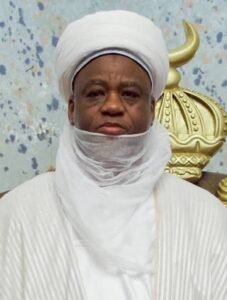INTERVIEW: “Without Taqwa, Society Falls into Corruption; With It, Peace and Justice Flourish” – Imam Saheed Oladele

In today’s world, where distractions and challenges are constant, Muslims are called to return to the foundational principles of their faith for guidance and strength. Among these principles, Taqwa (God-Consciousness) stands out as one of the most emphasized in both the Qur’an and the Sunnah. It is not only a matter of personal piety but also the guiding compass for relationships, decision-making, leadership, and social justice.
To shed more light on this profound concept, Afri Reporters sat down with Imam Saheed Oladele in an exclusive interview as part of the Islam Views Series. In this engaging discussion, Imam Oladele explains the meaning, relevance, and practical application of Taqwa in the life of every Muslim, offering insights into how it can serve as the key to both worldly success and eternal salvation.
To begin with, how would you explain the meaning of Taqwa in simple terms for the general Muslim audience?
Taqwa means being very conscious of Allah, openly and secretly, obeying Him, and avoiding sins.
The Qur’an mentions Taqwa as the true measure of honor and success. Why is Taqwa so central to Islam’s definition of success in this world and the Hereafter?
Taqwa is so central because it is a measure for Allah’s wisdom and guidance from all sorts of sins and forbidden acts, and above all it is the only gateway to paradise.
Could you share some Qur’anic verses or Hadith that best emphasize the importance of Taqwa?
The Qur’an says: “Indeed, the most noble of you in the sight of Allah is the one with the most Taqwa.” (Qur’an 49:13). It also says: “And take provisions, but indeed, the best provision is Taqwa. So fear Me, O you of understanding.” (Qur’an 2:197). Another verse reads: “And whoever has Taqwa of Allah – He will make for him a way out and provide for him from where he does not expect.” (Qur’an 65:2–3). Also, “Allah only accepts from those who have Taqwa.” (Qur’an 5:27). The Prophet said, “Taqwa is here,” while pointing to his chest three times (Muslim, 2564). He also said, “Fear Allah wherever you are, follow a bad deed with a good one and it will erase it, and deal with people with good character.” (Tirmidhi, 1987). In another Hadith, he said, “I advise you to have Taqwa of Allah and to listen and obey…” (Abu Dawud, 4607; Ibn Majah, 2858).

Many Muslims know the term but struggle with its practical application. What practical steps can Muslims take daily to build Taqwa?
I will personally suggest the following steps. Remember the name of Allah often. Observe your five daily prayers regularly and in congregation. Be mindful of your utterances. Always be in the company of righteous people. Be conscious of what you consume.
How does Taqwa influence the way a Muslim relates with others—in family life, business, and community interactions?
Taqwa makes every Muslim merciful and responsible in their family and makes them honest and trustworthy. It also makes one just, humble, and compassionate in society. That is why the Prophet ? said: “The most complete of the believers in faith are those with the best character.” (Tirmidhi).
In today’s world of constant distractions and temptations, how can young Muslims especially strengthen their Taqwa?
To strengthen Taqwa, young Muslims must first strengthen the heart through worship. They must guard their prayers by making all non-negotiable, engage with the Qur’an even in short recitations with reflection, and maintain daily dhikr, as a few minutes of remembrance shields the heart against heedlessness. They must also manage their digital life wisely by filtering their feeds, following accounts that remind them of Allah, unfollowing sources of temptation, and setting screen-free times for reflection, study, and family. Choosing good companions is also essential; they must surround themselves with friends who encourage all good deeds, and positive goals. In addition, developing self-discipline is important, through fasting on Mondays and Thursdays, resisting impulsive desires, and giving in charity. This builds spiritual resilience against bigger temptations. Practicing mindful accountability at the end of each day is also helpful by asking: “Did I please Allah today?” They must live with purpose, remembering that life is a test, and the Qur’an constantly links Taqwa with success in the Hereafter. Setting higher goals such as asking, “How will my studies, career, or talents serve Allah and benefit others?” is important. Finally, they must stay close to prayer and supplication, regularly asking Allah: “O Allah, grant me Taqwa and purify my soul, for You are the best to purify it.” (Muslim). Prayer is a shield and a reminder of our dependence on Him.

What role does Taqwa play in helping Muslims deal with trials, temptations, and challenges of life?
A heart rooted in Taqwa sees trials as temporary and reward as eternal. The believer develops resilience, knowing that even pain is a form of purification and elevation in rank. Taqwa teaches optimism: every difficulty has a hidden blessing if endured with faith.
Some people think Taqwa is limited to personal piety. How would you explain its wider impact on society, justice, and leadership?
Taqwa goes far beyond personal worship. It is the foundation of ethical behaviour, social harmony, fair justice, and righteous leadership. Without it, society falls into corruption and oppression; with it, society flourishes with peace, dignity, and trust.
Can you give examples from the life of the Prophet Muhammad ? or his companions that illustrate how they lived with Taqwa?
From the life of the Prophet, we learn fairness in justice without favouritism. When a noblewoman from Quraysh committed theft and people wanted to intercede for her, the Prophet ? said: “By Allah, if Fatimah the daughter of Muhammad were to steal, I would cut off her hand.” (Bukhari, Muslim). From the companions, we see the example of ?Umar ibn al-Khattab (RA). As Caliph, he walked the streets at night to ensure people’s welfare and once found a woman boiling water with stones to make her children think food was cooking. Moved by Taqwa and accountability before Allah, he carried flour on his own back to her house. When someone offered to help, he replied: “Will you carry my burden on the Day of Judgment?” Abu Bakr (RA) also lived by Taqwa. He freed slaves like Bilal (RA) with his own wealth purely for Allah’s sake, not for any worldly gain. Allah praised this in the Qur’an: “And he who gives from his wealth to purify himself not seeking reward for anyone, but only the countenance of his Lord, the Most High.” (Qur’an 92:18–20).
Finally, what key advice would you give Muslims striving to make Taqwa the guiding principle of their lives in preparation for the Hereafter?
If a Muslim makes Taqwa their guiding principle, their heart will remain soft, their deeds will be sincere, and their journey toward the Hereafter will be filled with light and hope. As Allah says: “And take provisions, but indeed, the best provision is Taqwa. So fear Me, O you of understanding.” (Qur’an 2:197).
Imam Saheed Oladele Omoteji is a Nigerian Islamic preacher, social commentator, and public educator known for his engaging and culturally relevant approach to da’wah. He is active on social media, especially Facebook, where he addresses contemporary issues affecting Muslims—particularly within the Yoruba-speaking southwest of Nigeria.
Imam Oladele is recognized for his outspoken views on matters of faith, identity, and morality, often using relatable language that blends English and Yoruba expressions. His posts reflect a deep concern for the preservation of Islamic values in the face of growing secular influences, especially among public figures such as entertainers and musicians.

With a practical and direct tone, he speaks to both the youth and wider Muslim audience, offering reminders rooted in Qur’anic principles and prophetic guidance. His da’wah efforts are not limited to traditional settings but extend into online platforms, community discussions, and possibly local radio programmes.
He is a director at The Patient Academy and also a lead missioner at Nasfat Olowora group.






